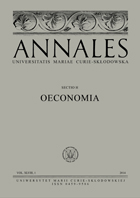Real Estate as Investment Instruments in Poland Between 2020 and 2023
Real Estate as Investment Instruments in Poland Between 2020 and 2023
Author(s): Justyna RybackaSubject(s): National Economy, Financial Markets, Socio-Economic Research
Published by: Wydawnictwo Naukowe Uniwersytetu Marii Curie-Sklodowskiej
Keywords: real estate; investment instruments; property;
Summary/Abstract: Theoretical background: The article constitutes an analysis of the macroeconomic situation from 2020 to the first quarter of (Q1) in relation to real estate investments. Factors such as the COVID-19 pandemic, the influx of refugees to Poland, and rising inflation had a significant impact on investor behavior in the discussed market. The dynamic macroeconomic situation also led to changes in consumer and tenant pref- erences, while significantly affecting demand and supply. The years 2020–2023 (Q1) were characterized by a distinct specificity that accentuated the risks associated with real estate investments. This emphasized clear differences in various categories between real estate as investment assets and funds, securities, or other alternative investment methods.Purpose of the article: The aim of the article is to identify the risks associated with real estate investment in Poland during the period from 2020 to 2023 (Q1). It is also crucial to describe the macroeconomic aspects and their impact on the investment real estate market during the mentioned period.Research methods: The article presents the results of an empirical study aimed at identifying factors contributing to the increase in risk associated with real estate investment in the years 2020–2023 (Q1). Additionally, it was significant to verify the financing methods for the purchase of investment properties by the survey participants. The study was based on a survey questionnaire. A total of 250 respondents partici- pated in the study, expressing their willingness to purchase their first or subsequent property for investmentpurposes during the years 2020–2023 (1Q). Respondents were asked 7 questions, including those related to factors influencing or hindering the completion of investment property transactions in the years 2020–2023 (Q1), as well as the method of financing the purchase and the reason why respondents utilized borrowed capital or relied solely on their own funds. Furthermore the article employed a research methodology that included critical analysis of secondary sources, as well as methods such as analysis, synthesis, description, deduction, induction, and reduction. The Polish and foreign literature related to investment and investment properties was subjected to analysis. Additionally, laws, resolutions, regulations, scientific works from other organizations, and reports were studied, serving as valuable sources of information about the real estate market situation from 2020 to 2023 (Q1). In formulating recommendations, a generalizing-synthesizing method was employed (deduction, reduction, induction). The inductive method aided in analyzing the sig- nificance and characteristics of investment properties. On the other hand, the deductive method was used to analyze the issue starting from the macroeconomic situation in Poland and delving into the changes in the investment real estate market. By making a critical analysis of the literature, the reduction technique was applied, thus, verifying the previously formulated hypotheses.Main findings: Based on the conducted analysis, it can be observed that the return on equity (ROE) from real estate investments takes on a negative value when investors partially use borrowed capital. This situation is influenced by high interest rates. However, alongside this factor, there is also a social element related to the high demand for property rentals. In the case of investors investing solely from their own sources, this leads to a return on equity ranging between 2.7% and 3.6% during the analyzed time period. The conducted analysis reveals that macroeconomic, social, and legal factors dynamically shape the demand and supply in the real estate market during the period from 2020 to 2023 (Q1). This is closely related to the decisions of investors aiming to invest their capital in investment properties.
Journal: Annales Universitatis Mariae Curie-Skłodowska, Sectio H Oeconomia
- Issue Year: LVIII/2024
- Issue No: 2
- Page Range: 153-170
- Page Count: 18
- Language: English

